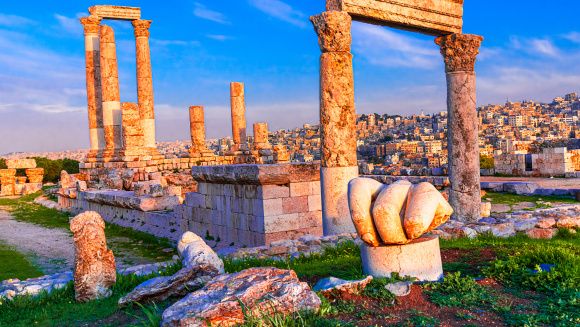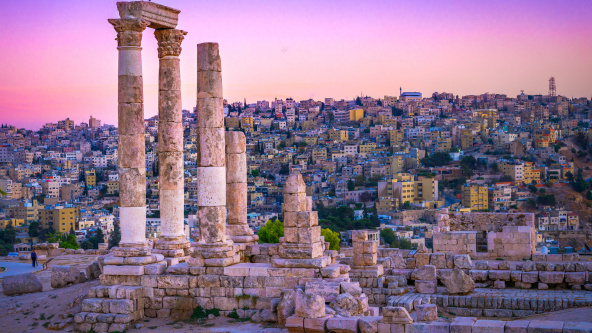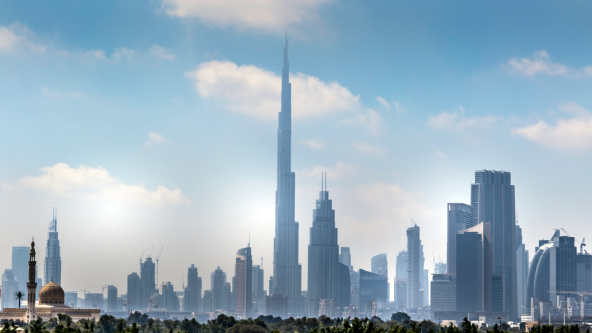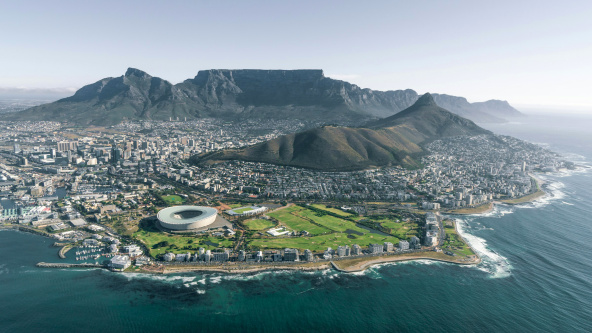Living in Amman: an expat guide

What to expect when moving to Amman
Most international flights to Jordan land at Queen Alia International Airport, named after His Majesty, the late King Hussein’s third wife who was killed in a helicopter accident when their two children were very young. With an eye-catching re-design by Norman Foster, it is some 30 kms south of Amman on the Desert Highway, the main road link between Amman and Aqaba on the Red Sea.
The drive from the airport into town encapsulates many aspects of life in Jordan. First, the road is generally good with two lanes in each direction becoming three as you approach the centre. The route is punctuated by large, American-style advertisements dominating the verges; mobile phones, banks, development agencies, and consumer goods are all there.
The road is also lined with trees, a legacy from the days when Taher Al Masri was the country’s Prime Minister for a brief period in 1991. The shade afforded by the trees is so valued by city families that the sides of this busy highway are one of the favourite picnic destinations on the Sabbath and Bank Holidays. The standard of driving on this road is also generally good – the lack of lane discipline by the proud drivers of old, second-hand cars being less irritating than the occasional examples of aggressive driving by the wealthy in their four-by-fours and Humvees.
The standard of street cleanliness is not good, although the Government launches campaigns from time to time to try to improve the situation. Its cause is a kind of thoughtlessness, and an assumption that someone else will clear up after you: at home, it’s the maid, and on the streets, it is one of the 500,000 immigrant workers – chiefly Egyptian.
Is Jordan a religious country?
The religion of most Jordanians is Islam. Each small district has its mosque and the day, for all within hearing distance, is punctuated by the call to prayer. A sense of God and religion is more obvious here than in Europe. The holy month of Ramadan sees almost all of the population fast from sunrise to sunset. Lorry drivers out on the desert highway will park their vehicles, kneel on their prayer mats, face Mecca and make their devotions at the appointed times. Hotel bell boys will find a quiet corner of the hotel garden and do the same. Everyday speech is laden with ‘Thanks be to God’ and ‘If God wills’.
It is, however, a country of great religious tolerance. Five per cent of the population are Christian and their churches are as prominent and beautifully built as the mosques. Religious services for different dominations vary from Greek Orthodox or Roman Catholic to those found at Baptist and Anglican churches.
Culture and traditions
Many Jordanian women now wear the hijab to cover their hair. This seems to be a cultural rather than a religious requirement. Although less obvious in Amman, the traditional sense of public places being the domain of the men and the home being the domain of the women is very noticeable. Jordanian men work hard, often having two jobs. They will also be seen doing the family grocery shopping and organising family picnics in the countryside on days off.
The price, by Western standards, that the women pay for the hard work of the men, is a life largely lived within the home, providing the meals and entertaining and caring for the children. The value of this in the nurture of the children cannot be measured, but there is a sense that the country has untold, untapped resources in its women whose varied skills and talents are never made available through the medium of paid work.
Jordanian pride
Jordan is a country that will quickly win your heart but will also nearly break it. Your heart will be won by the extraordinary kindness and friendliness of its people. ‘Welcome’ is the first English word that most Jordanians regularly use. They are proud and grateful that you have come to their country. They want you to know about their lives and to meet their families. Waiters, taxi drivers, bellboys, and shopkeepers will be quick to invite you to their homes for a meal. If you inadvertently break a social code, there is tolerance and understanding.
Your heart will be won by the extraordinary kindness and friendliness of its people. ‘Welcome’ is the first English word that most Jordanians regularly use.
So why would this country also nearly break your heart? It is full of people who marry young, start large families young, and find it very difficult to carve individual lives away from the intensely influential wider family unit. The average monthly wage is low. Improving yourself and achieving upward social mobility is becoming easier but is still very difficult.
One of Jordan’s great strengths is that it has little that anyone else wants. It has no oil. Potash is its most valuable mineral resource. Its greatest ‘dollar-earner’ is tourism. Under the guardianship of His Majesty King Abdullah, it strives to maintain its life and standards while the world observes, occasionally acts, and pontificates about the dangerous lives of its neighbours. As long as such a situation holds, Jordan will never realise its potential as a magnet for the world’s tourists, although foreign aid is coming in for the development of eco-tourism and the conservation of the environment.
Where to live in Amman
Most expats in Jordan are provided with accommodation arranged by their companies. Such homes are spacious, whether villas or apartments. Most have two or three aspects so that, even in the heat, cool air can be directed through the living space. It is therefore possible to live quite comfortably without air-conditioning.
Most expats will live in West Amman. There, all the road signs are bilingual, though the English spelling may vary from junction to junction. The most important radius road in terms of orientation is Zahran Street. This runs from the city's western bypass (an extension of the Desert Highway) to Jebel Amman, the high point which overlooks the old city centre. There are eight ‘circles’ on Zahran Street – six of these are roundabouts, one is a T-junction, and the other is a flyover.
Getting started in Amman
Finding home help
Most homes employ a maid, often Filipino, Sri Lankan, or Indonesian. These can be recruited from agencies spread throughout the capital.
Other good sources for finding housekeeping staff and babysitters remain the community notice boards located in such places as the British Embassy Club or the American Community Liaison Office. Word of mouth at school is also useful.
Odd jobs such as tidying your garden will willingly be taken on by the immigrant street cleaners on their day off; they will also offer a daily wash of your car for a token payment.
Should your home water works or electrics go adrift, there are streets full of repairmen in Swefieh and most districts that will come and do a home repair job. Another good source is to approach Bashiti Home and Garden supplies store which has a list of tradesmen who deposit their business cards with them on the off chance that someone will go there seeking help. Failing that, you can turn to the Yellow Pages or one of the city's free guides.
Mobile phones
Amman bristles with mobile phones. You will be more aware of your neighbour’s ringtone in Amman than any other place you’ve been to. Once connected, you will also be aware of your neighbour’s business.
Banking
The banking system is one of Jordan's largest economic sectors and among those with consumer branches are the Bank of Jordan, Cairo Amman Bank, and Jordan Kuwait Bank, whilst the more familiar Standard Chartered and Citibank also operate here.
Healthcare
Most expats have health insurance provided by their employers. This, of course, is a passport to the best healthcare that Jordan can offer. Many doctors have been trained in Europe, America, or Russia and the profession is one that many young Jordanians aspire to. The capital abounds with new hospitals as medical tourism is a booming and lucrative market especially for visiting Gulf workers, escaping summer in their work bases. Around each of these facilities, there are often a multitude of medical labs and doctor’s offices, each displaying huge signs indicating their many and varied expertise.
Day-to-day living in Amman
All the large hotels have excellent café and restaurant facilities. The major hotels also have good deals for their leisure/health facilities. Outdoor swimming pools are comfortable here from May to October/November. There are many excellent coffee shops/cafes, both those modelled on European or American chains, and the cheaper but equally delicious Jordanian outlets. You will find most nationalities enjoying the bakery-cum-wine-bar of Crumz, one of the few coffee shops to stay open during Ramadan.
Traffic and drivers
Some people may have drivers. There is no doubt that this is a city in which it is more relaxing to be driven, preferably in a car that you don’t care too much about, than to drive. A quarter of all cars in Amman are taxis. They are not only plentiful but cheap with most drivers having at least a little English. The frenetic nature of city-centre driving is less a result of aggression than an extraordinary unawareness of rules or other people on the road. Given that, there are surprisingly few accidents.
Grocery shopping
There is almost nothing that cannot be bought in Amman. Food shopping can be done in branches of Safeway, C Town, Plaza Superstores, Carrefour, and Cozmo. Not all supermarkets sell alcohol – if they do, it is very expensive. ‘Packet stores’ in local parades are where most alcohol is sold. Fruit is plentiful and delicious. There is a greater sense of the seasons in Jordan, with fruits being seasonal, particularly dates, apricots, grapes, figs, and melons.
The last word
Amman is a wonderful springboard for visiting the country’s historical treasures. The Roman Decapolis city of Jerash is a 30-minute drive north and an hour further on is another Um Qais (ancient Gadara, famous for the Casting into Swine Bible story) with its spectacular views of the Sea of Galilee and the Golan Heights. The Dead Sea is less than an hour’s drive west. Three hours south is the extraordinary hidden city of ‘rose-red’ Petra. A little further is Wadi Rum (of ‘Lawrence of Arabia’ fame) and, at the country’s southern tip, the resort and port of Aqaba on the Red Sea. Petrol is reasonable and the hotel prices are wide-ranging. A weekend away from the city is therefore easy and inexpensive and quite often needed.
If you’re looking for a school abroad, our expert consultants can advise on all aspects of international education, from schools to local educational scenes.
Tags: Family



